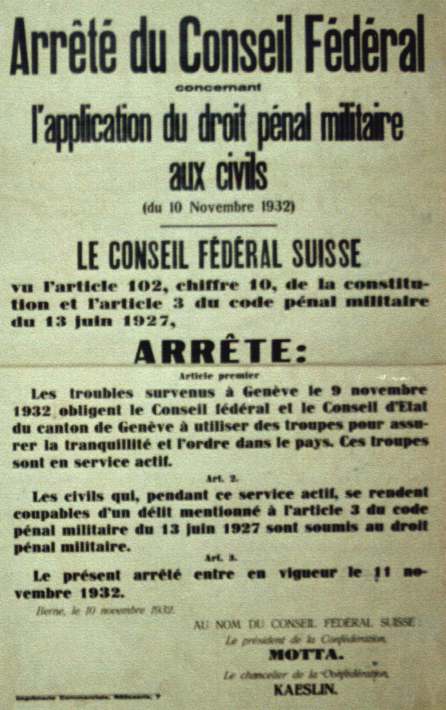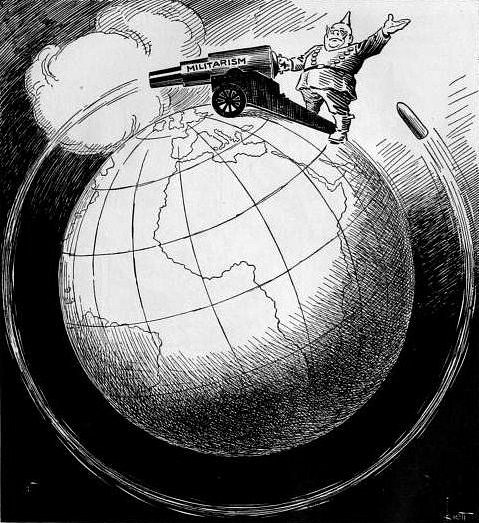|
November 1932 Geneva Shooting
On 9 November 1932, elements of the Swiss Army under Major Perret fired live rounds into a crowd of anti-fascist protesters in Plainpalais in Geneva, killing 13 and wounding 65. The shooting occurred on a background of increasing violence between far-right and far-left groups, of rising totalitarian regimes, and of unemployment and economic crisis in Europe. The incident stemmed from inappropriate crowd control tactics, excitation of the antimilitarist protesters after a speech by socialist leader Léon Nicole, a series of incompetent orders, and a force made up of improperly trained officers and soldiers — who had only had six weeks of military training before their deployment. Exactly how events unfolded and who bears responsibility for them are still a matter of debate. A commemorative monument was unveiled on 9 November 1982 for the 50th anniversary of the shooting on the Southern end of Plainpalais, near the place of the events. On 10 September 2008, the State Council ... [...More Info...] [...Related Items...] OR: [Wikipedia] [Google] [Baidu] |
Plainpalais
Plainpalais is a neighbourhood in Geneva, Switzerland, and a former Municipalities of the canton of Geneva, municipality of the Canton of Geneva. It is mentioned in Mary Shelley's ''Frankenstein'' in chapter 6, volume 1. Argentine author Jorge Luis Borges' ashes are buried in the cemetery of Plainpalais. Plaine de Plainpalais The Plaine de Plainpalais is a large public square (78 135 square metres). It is home of the Plainpalais skatepark. Inaugurated in 2012, the Plainpalais skatepark is intended for young people over the age of 10 who practise skateboarding, roller skating and BMX bike, BMX riding at any level. Covering 3,000 m2, it is one of the biggest skate parks in Europe. References See also * Geneva massacre of 9 November 1932 Municipalities of the canton of Geneva {{Geneva-geo-stub ... [...More Info...] [...Related Items...] OR: [Wikipedia] [Google] [Baidu] |
André Bösiger
André Bösiger (born July 22, 1913 in Perrefitte; died in Geneva on April 13, 2005) was a Swiss anarcho-syndicalist. An activist of the ''Building Action League'' in Geneva, he collaborated with the '' Réveil anarchiste'' and the International Center for Research on Anarchism (Lausanne). Biography A construction worker, he joined the ''Building Action League'' where he befriended the anarchists Luigi Bertoni (editor of '' Il Risveglio anarchico'') and Lucien Tronchet. The ''Building Action League'' actively practiced sabotage and direct action as well as helping unemployed people that were evicted from their homes. He also participated in the anarchist group of Geneva and took part in the activities of freethought. On November 9, 1932, he took part in the demonstration to prevent the holding of a public conference of the National Union, a fascist political party created by Georges Oltramare, in the communal hall of Plainpalais in Geneva. A detachment of the Swiss Army was c ... [...More Info...] [...Related Items...] OR: [Wikipedia] [Google] [Baidu] |
Liberal Party Of Switzerland
french: Parti liberal suisse it, Partito Liberale Svizzero rm, Partida liberala svizra , logo = LPS.Logo.jpg , foundation = , dissolution = , merged = FDP.The Liberals , headquarters = Spitalgasse 32, Case postale 71073001 Bern , ideology = Libertarianism (Switzerland)Economic liberalismSoft Euroscepticism , position = Centre-right , international = Liberal International , european = European Liberal Democrat and Reform Party , colours = Blue , country = Switzerland The Liberal Party of Switzerland (german: link=no, Liberale Partei der Schweiz, french: link=no, Parti liberal suisse, it, Partito Liberale Svizzero, rm, Partida liberala svizra) was a political party in Switzerland with economically liberal policies. It was known as a party of the upper class. On 1 January 2009 it merged with the larger Free Democratic Party (FDP/PRD) to establish FDP.The Liberals. It was strongest in the Protestant cantons in Romandy, particularly in the cantons of Geneva, Vaud and ... [...More Info...] [...Related Items...] OR: [Wikipedia] [Google] [Baidu] |
Free Democratic Party Of Switzerland
french: Parti radical-démocratique it, Partito Liberale Radicale rm, Partida liberaldemocrata svizra , logo = Free Democratic Party of Switzerland logo French.png , logo_size = 200px , foundation = , dissolution = , merged = FDP.The Liberals , headquarters = Neuengasse 20 Postfach 6136CH-3001 Bern , ideology = , position = Centre-right , international = Liberal International , european = European Liberal Democrat and Reform Party , europarl = , colours = Azure , country = Switzerland The Free Democratic Party or Radical Democratic Party (german: Freisinnig-Demokratische Partei, FDP; french: Parti radical-démocratique, PRD; it, Partito liberale-radicale svizzero, PLR; rm, Partida liberaldemocrata svizra, PLD) was a liberal political party in Switzerland. Formerly one of the major parties in Switzerland, on 1 January 2009 it merged with the Liberal ... [...More Info...] [...Related Items...] OR: [Wikipedia] [Google] [Baidu] |
Grand Council Of Geneva
The Grand Council of Geneva (french: Grand Conseil de Genève) is the legislature of the canton of Geneva, in Switzerland. Geneva, styled as a 'Republic and Canton', has a unicameral legislature. The Grand Council was established in its present form and with 100 seats in 1842, with members elected every four years. Its oldest ancestor is the Council of Two Hundred (with 200 seats), founded in 1526. , Helvetia-genevensis Society. Members of the canton's executive, the Conseil d'Etat, are elected a month later. There is a 7% threshold that political parties ... [...More Info...] [...Related Items...] OR: [Wikipedia] [Google] [Baidu] |
University Of Geneva
The University of Geneva (French: ''Université de Genève'') is a public research university located in Geneva, Switzerland. It was founded in 1559 by John Calvin as a theological seminary. It remained focused on theology until the 17th century, when it became a center for enlightenment scholarship. Today, it is the third largest university in Switzerland by number of students. In 1873, it dropped its religious affiliations and became officially secular. In 2009, the University of Geneva celebrated the 450th anniversary of its founding. Almost 40% of the students come from foreign countries. The university holds and actively pursues teaching, research, and community service as its primary objectives. In 2016, it was ranked 53rd worldwide by the Shanghai Academic Ranking of World Universities, 89th by the QS World University Rankings, and 131st in the Times Higher Education World University Ranking. UNIGE is a member of the League of European Research Universities (includi ... [...More Info...] [...Related Items...] OR: [Wikipedia] [Google] [Baidu] |
Council Of State Of Geneva
{{gov-stub ...
The Council of State of Geneva (french: Conseil d'État de Genève) is the executive organ of the République and Canton of Geneva, in Switzerland. Geneva has a seven-member '' Conseil d'État''. The last elections were held on 28 March 2021. Members Michèle Righetti holds the non-political position of State Chancellor. See also * Grand Council of Geneva External links Council of State official webpage Politics of the canton of Geneva Geneva , neighboring_municipalities= Carouge, Chêne-Bougeries, Cologny, Lancy, Grand-Saconnex, Pregny-Chambésy, Vernier, Veyrier , website = https://www.geneve.ch/ Geneva ( ; french: Genève ) frp, Genèva ; german: link=no, Genf ; it, Ginevr ... [...More Info...] [...Related Items...] OR: [Wikipedia] [Google] [Baidu] |
Antimilitarist
Antimilitarism (also spelt anti-militarism) is a doctrine that opposes war, relying heavily on a critical theory of imperialism and was an explicit goal of the First and Second International. Whereas pacifism is the doctrine that disputes (especially between countries) should be settled without recourse to violence, Paul B. Miller defines anti-militarism as "ideology and activities...aimed at reducing the civil power of the military and ultimately, preventing international war". Cynthia Cockburn defines an anti-militarist movement as one opposed to " military rule, high military expenditure or the imposition of foreign bases in their country". Martin Ceadel points out that anti-militarism is sometimes equated with pacificism—general opposition to war or violence, except in cases where force is deemed necessary to advance the cause of peace.Martin Ceadel, 'Thinking about peace and war''. Oxford, Oxford University Press, 1987. , p. 101. Distinction between antimilitarism and paci ... [...More Info...] [...Related Items...] OR: [Wikipedia] [Google] [Baidu] |
Crowd Control
Crowd control is a public security practice in which large crowds are managed in order to prevent the outbreak of crowd crushes, affray, fights involving drunk and disorderly people or riots. Crowd crushes in particular can cause many hundreds of fatalities. Effective crowd management is about managing expected and unexpected crowd occurrences. Crowd control can involve privately hired security guards as well as police officers. Crowd control is often used at large, public gatherings like street fairs, music festivals, stadiums and public demonstrations. At some events, security guards and police use metal detectors and sniffer dogs to prevent weapons and drugs being brought into a venue. Equipment Materials such as stanchions, crowd control barriers, fences and decals painted on the ground can be used to direct a crowd. A common method of crowd control is to use high visibility fencing to divert and corral pedestrian traffic to safety when there is any potential threat for ... [...More Info...] [...Related Items...] OR: [Wikipedia] [Google] [Baidu] |
Wall Street Crash Of 1929
The Wall Street Crash of 1929, also known as the Great Crash, was a major American stock market crash that occurred in the autumn of 1929. It started in September and ended late in October, when share prices on the New York Stock Exchange collapsed. It was the most devastating stock market crash in the history of the United States, when taking into consideration the full extent and duration of its aftereffects. The Great Crash is mostly associated with October 24, 1929, called ''Black Thursday'', the day of the largest sell-off of shares in U.S. history, and October 29, 1929, called ''Black Tuesday'', when investors traded some 16 million shares on the New York Stock Exchange in a single day. The crash, which followed the London Stock Exchange's crash of September, signaled the beginning of the Great Depression. Background The "Roaring Twenties", the decade following World War I that led to the crash, was a time of wealth and excess. Building on post-war optimism, rural Amer ... [...More Info...] [...Related Items...] OR: [Wikipedia] [Google] [Baidu] |
Unemployment
Unemployment, according to the OECD (Organisation for Economic Co-operation and Development), is people above a specified age (usually 15) not being in paid employment or self-employment but currently available for Work (human activity), work during the reference period. Unemployment is measured by the unemployment rate, which is the number of people who are unemployed as a percentage of the labour force (the total number of people employed added to those unemployed). Unemployment can have many sources, such as the following: * new technology, technologies and inventions * the status of the economy, which can be influenced by a recession * competition caused by globalization and international trade * Policy, policies of the government * regulation and market (economics), market Unemployment and the status of the economy can be influenced by a country through, for example, fiscal policy. Furthermore, the monetary authority of a country, such as the central bank, can influ ... [...More Info...] [...Related Items...] OR: [Wikipedia] [Google] [Baidu] |
Far-left
Far-left politics, also known as the radical left or the extreme left, are politics further to the left on the left–right political spectrum than the standard political left. The term does not have a single definition. Some scholars consider it to represent the left of social democracy, while others limit it to the left of communist parties. In certain instances, especially in the news media, ''far-left'' has been associated with some forms of authoritarianism, anarchism, and communism, or it characterizes groups that advocate for revolutionary socialism, Marxism and related communist ideologies, anti-capitalism or anti-globalization. Extremist far-left politics have motivated political violence, radicalization, genocide, terrorism, sabotage and damage to property, the formation of militant organizations, political repression, conspiracism, xenophobia, and nationalism. Far-left terrorism consists of militant or insurgent groups that attempt to realize their ideals through ... [...More Info...] [...Related Items...] OR: [Wikipedia] [Google] [Baidu] |




.jpg)